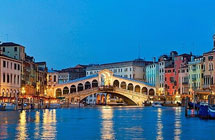威尼斯颁布旅游新规:运河勿游泳,桥上不久留
|
夏季涌入的大量游客让威尼斯政府和市民大伤脑筋。为了让游客文明旅游,不把威尼斯当成大号游乐园或者是公共海滩,威尼斯政府近日颁布旅游新规,其中包括禁止在运河游泳、禁止在桥上久留等。 Respect Venice. You’re welcome here but you must play by the rules – or pay for it. That’s the message from the Venetian authorities, who have unveiled a new campaign, aimed at tourists, to encourage them to behave appropriately in a city which is struggling to cope with the influx of visitors, and where locals are at boiling point over their home being used as a global playground.
Paola Mar, the councillor responsible for tourism, announced that a campaign called #EnjoyRespectVenezia will launch in time for the summer crush. The campaign will be spearheaded across social media, shown on the city council’s website, and provide reminders in the shape of posters around town and flyers at locations like the train station. Visitors will be reminded not to swim in canals, make picnic stops out of public areas, pause too long on bridges, drop litter, ride bikes through the city or sightsee in bathing suits – all apparently common phenomena. Transgressors will be fined anything from €25 to €500. “The message we have to get through is that we’re not joking,” Mar told local paper La Nuova. “If it gets about that people who do this kind of thing are fined, as well as it being flagged to their respective embassies, perhaps we’ll be able to stop others copying.” Only last weekend, a group of Belgian teenagers went viral when they posted a video of themselves jumping off the bridge designed by architect Santiago Calatrava into the Grand Canal. They have subsequently apologised for their behaviour. Last August, a tourist jumping from the Rialto Bridge hit a water taxi and died in hospital. The new campaign has been a long time in the planning. Last month, Mar told The Independent their “behavioural campaign” would have 12 golden rules – both prohibitory and encouraging, too. “The problem is that Venice is perceived as a beach,” she said. The campaign will be launched in 10 languages, including English, Chinese, Arabic and Korean. It will include suggestions on how to change typical behaviour – including highlighting official picnic areas and public toilets. Meanwhile, the largest island in the lagoon, the Lido, is embarking on a sustainable tourism initiative. |









